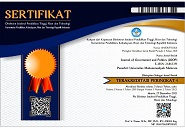Exploring Paradiplomacy Pathways: Local Government and Foreign Direct Investment Corporation Partnerships for Sustainable Development
Abstract
The present article delineates the collaboration between the Government of East Luwu Regency (Local Government) and PT. Vale Indonesia, Tbk, (Corporation) as a case in point of executing paradiplomacy to achieve sustainable development objectives. The findings of the qualitative research reveal that PT. Vale Indonesia, Tbk., has made a noteworthy contribution to the growth of the local economy and the development of infrastructure through its strategic partnership. Meanwhile, the government of East Luwu Regency has ensured adherence to the principles of sustainable development. The present investigation also highlights the primary obstacles encountered in the execution of paradiplomacy, such as ensuring a fair allocation of advantages and involving the community in the decision-making procedures. The present study substantiates the significance of paradiplomacy as a tactical instrument for attaining sustainable development and highlights the possibility of collaboration between subnational governments and transnational corporations in accomplishing this objective.
Keywords
Full Text:
PDFReferences
Aust, V., Morais, A. I. and Pinto, I. (2020) ‘How does foreign direct investment contribute to Sustainable Development Goals? Evidence from African countries’, Journal of Cleaner Production, 245, p. 118823. doi: 10.1016/j.jclepro.2019.118823.
Basrowi, B. and Suwandi, S. (2008) Memahami Penelitian Kualitatif. Jakarta: Rineka Cipta.
Benton, J. E. (2013) ‘Local Government Collaboration’, State and Local Government Review, 45(4), pp. 220–223. doi: 10.1177/0160323X13515683.
Bungin, B. (2007) Penelitian Kualitatif, Komunikasi, Ekonomi, Kebijakan Publik, dan Ilmu Sosial Lainnya. Jakarta: Kencana.
Canfei, H. (2006) ‘Regional Decentralisation and Location of Foreign Direct Investment in China’, Post-Communist Economies, 18(1), pp. 33–50. doi: 10.1080/14631370500505131.
Chatterji, R. and Saha, S. (2017) ‘Paradiplomacy: Concept and the Context’, India Quarterly: A Journal of International Affairs, 73(4), pp. 375–394. doi: 10.1177/0974928417731638.
Chen, T.-J., Chen, H. and Ku, Y.-H. (2004) ‘Foreign direct investment and local linkages’, Journal of International Business Studies, 35(4), pp. 320–333. doi: 10.1057/palgrave.jibs.8400085.
Clark, W. and Lund, H. (2007) ‘Sustainable development in practice’, Journal of Cleaner Production, 15(3), pp. 253–258. doi: 10.1016/j.jclepro.2006.02.001.
Creswell, J. W. (2012) Metode Penelitian Kualitatif. Yogyakarta: Pustaka Pelajar.
Criekemans, D. (2008) Are The Boundaries between Paradiplomacy and Diplomacy Watering Down? Belgium: University of Anwerp and Flemish Centre for International Policy.
Damayanti, C. (2012) ‘Potensi Paradiplomasi Dalam Mendukung Kinerja Diplomasi Indonesia Menuju Komunitas ASEAN’, Transformasi, 14(22).
Dubrovina, О. V and Salamov, R. R. (2019) ‘Paradiplomacy as a New Architecture of International Relations’, Political Science Issues, 33(3), pp. 311–315. doi: 10.35775/psi.2019.33.3.010.
Dziemianowicz, W., Łukomska, J. and Ambroziak, A. A. (2019) ‘Location factors in foreign direct investment at the local level: the case of Poland’, Regional Studies, 53(8), pp. 1183–1192. doi: 10.1080/00343404.2018.1530750.
Fathun, L. M. (2016) ‘Paradiplomasi Menuju Kota Dunia: Studi Kasus Pemerintah Kota Makassar’, Indonesian Perspective, 1(1), pp. 75–94. doi: 10.14710/ip.v1i1.10430.
Harakan, A. (2018) ‘Paradiplomasi Dalam Percepatan Pembangunan Infrastruktur Fisik dan Sosial di Kabupaten Bantaeng’, Jurnal Power in International Relations (PIR), 3(1). doi: http://dx.doi.org/10.22303/pir.3.1.2018.1-15.
Harakan, A. (2020) Paradiplomasi Investasi. Yogyakarta: Samudra Biru.
Jati, W. R. (2016) ‘Inkonsistensi Paradigma Otonomi Daerah di Indonesia: Dilema Sentralisasi atau Desentralisasi’, Jurnal Konstitusi, 9(4), p. 743. doi: 10.31078/jk947.
Jatmika, S. (2001) Otonomi Daerah: Perspektif Hubungan Internasional. Yogyakarta: Bigraf Pub.
Jönsson, C. (2018) ‘Non-State Actors and Diplomacy’, The Encyclopedia of Diplomacy. (Major Reference Works), pp. 1–4. doi: doi:10.1002/9781118885154.dipl0460.
Lindblad, J. T. (2015) ‘Foreign Direct Investment in Indonesia: Fifty Years of Discourse’, Bulletin of Indonesian Economic Studies, 51(2), pp. 217–237. doi: 10.1080/00074918.2015.1061913.
Mensah, J. (2019) ‘Sustainable development: Meaning, history, principles, pillars, and implications for human action: Literature review’, Cogent Social Sciences. Edited by S. Ricart Casadevall, 5(1), p. 1653531. doi: 10.1080/23311886.2019.1653531.
Miles, M. B. and Huberman, A. M. (2007) Analisis Data Kualitatif : Buku Sumber Tentang Metode-Metode Baru. Jakarta: Universitas Indonesia Press.
Mukti, T. A. (2013a) Paradiplomacy Kerjasama Luar Negeri oleh Pemda di Indonesia. Yogyakarta: The Phinisi Press.
Mukti, T. A. (2013b) ‘Sistem Pasca Westphalia, Interaksi Transnasional dan Paradiplomacy’, Jurnal Hubungan Internasional, 2(2), pp. 175–183. doi: 10.18196/hi.2013.0039.175-183.
Mukti, T. A. et al. (2021) ‘Paradiplomacy Policies and Regional Autonomy in Indonesia and Korea’, Jurnal Hubungan Internasional, 9(2), pp. 139–152. doi: 10.18196/jhi.v9i2.8931.
Mulyana, D. (2010) Metodologi Penelitian Kualitatif, Paradigma Baru Ilmu Komunikasi dan Ilmu Sosial Lainnya. Bandung: PT. Remaja Rosdakarya.
Novialdi, R. and Rassanjani, S. (2020) ‘Optimizing the Ability of Aceh Province in Paradiplomacy Practice’, Nation State: Journal of International Studies, 3(1).
Peters, B. G. (2018) ‘The challenge of policy coordination’, Policy Design and Practice, 1(1), pp. 1–11. doi: 10.1080/25741292.2018.1437946.
Rifaid, R. et al. (2023) ‘Smart City Development in the New Capital City: Indonesian Government Plans’, Journal of Contemporary Governance and Public Policy, 4(2), pp. 115–130. doi: 10.46507/jcgpp.v4i2.141.
Rugman, A. M., Lecraw, D. J. and Booth, L. D. (1985) International Business: Firm and Environment. New York: McGraw-Hill College.
Scott-Kennel, J. (2007) ‘Foreign direct investment and local linkages: An empirical investigation’, Management International Review, 47(1), pp. 51–77. doi: 10.1007/s11575-007-0004-6.
Shi, L. et al. (2019) ‘The Evolution of Sustainable Development Theory: Types, Goals, and Research Prospects’, Sustainability, 11(24), p. 7158. doi: 10.3390/su11247158.
Sugiyono, S. (2016) Metode Penelitian Kuantitatif, Kualitatif dan R dan D. Bandung: Alfabeta.
Surwandono, S. (2019) ‘The Dynamics of Paradiplomacy Practices in the “Frontier” Areas in Indonesia’, JAS (Journal of ASEAN Studies), 6(2), p. 137. doi: 10.21512/jas.v6i2.5160.
Surwandono, S. and Maksum, A. (2020) ‘The Architecture of Paradiplomacy Regime in Indonesia: A Content Analysis’, Global: Jurnal Politik Internasional, 22(1), p. 77. doi: 10.7454/global.v22i1.443.
Utomo, A. B. (2020) ‘Reimagining City Identities in Globalisation: A Constructivist Study on City Paradiplomacy’, Global South Review, 1(2), p. 33. doi: 10.22146/globalsouth.54362.
Utomo, A. B. (2022) ‘Paradiplomacy as the product of state transformation in the era of globalisation: the case of Indonesia’, JANUS NET e-journal of International Relation, 13(1). doi: 10.26619/1647-7251.13.1.5.
Warm, D. (2011) ‘Local Government Collaboration for a New Decade: Risk, Trust, and Effectiveness’, State and Local Government Review, 43(1), pp. 60–65. doi: 10.1177/0160323X11400436.
DOI: https://doi.org/10.31764/jgop.v5i1.15505
Copyright (c) 2023 Ahmad Harakan, Ahmad Taufik
This publication is indexed by:





.png)










1.JPG)